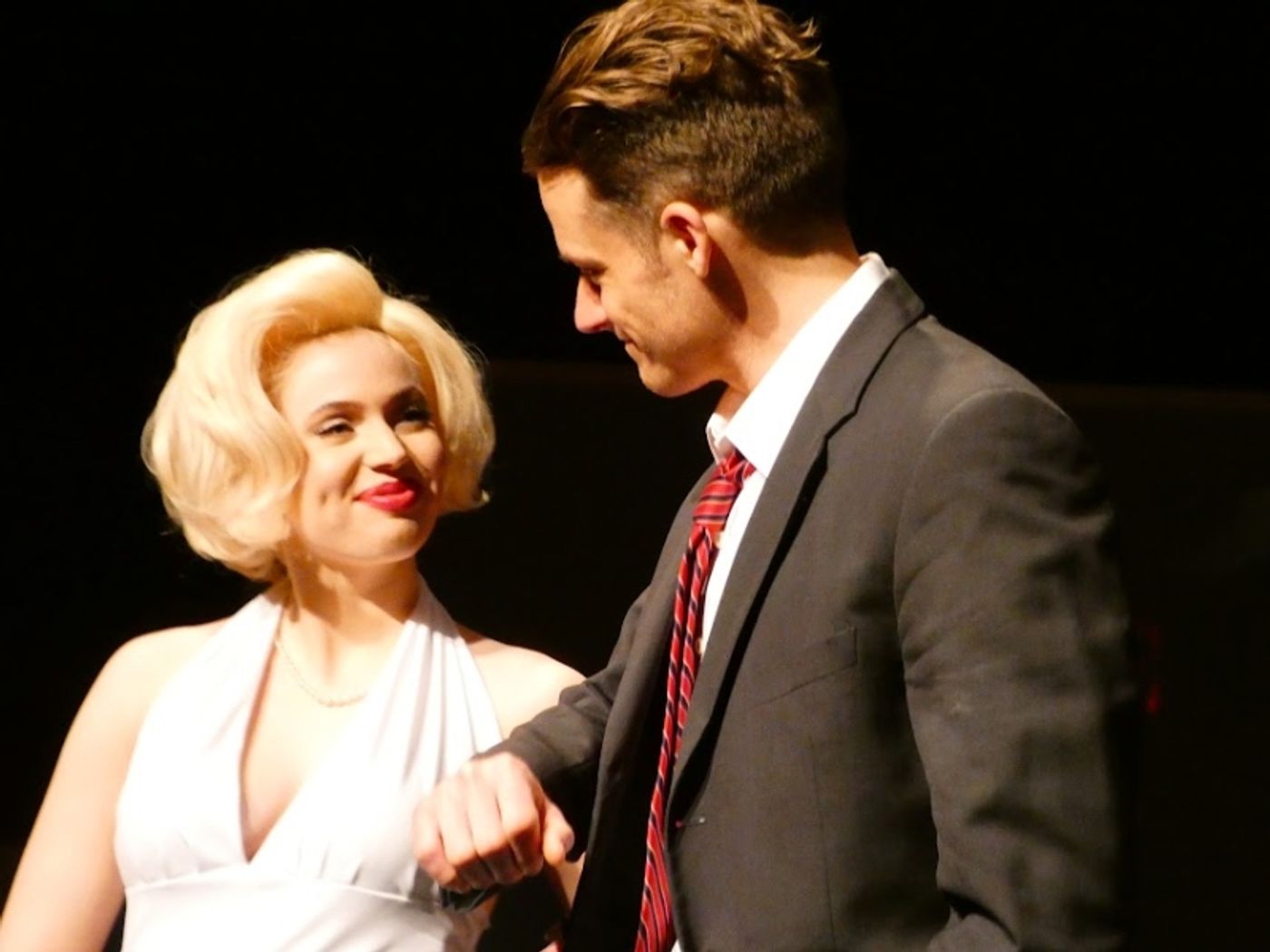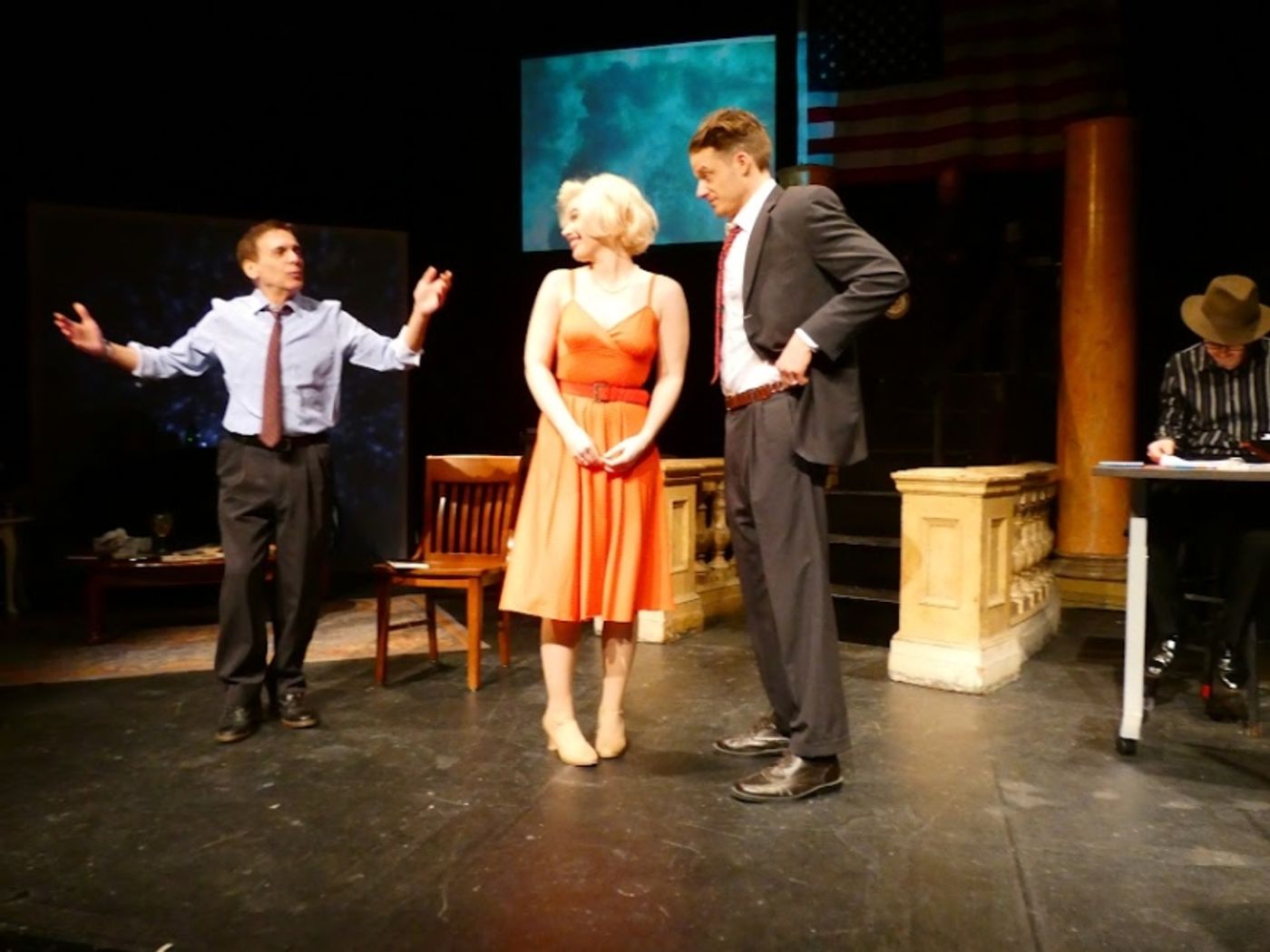BWW Reviews: The Conflicts of Fact, Fiction and Freedom in Solnik's THE UNAMERICAN
The UnAmerican ran from February 24th to March 13th at Theater for the New City (located at 155 1st Avenue in NYC's East Village)
 Is it possible to review a show about politics without being political? Is it acceptable not to write about which perspective is right or wrong, but instead comment on what drives a person to instead accept one viewpoint over another? What constitutes a person's sense of morality - what do we choose to follow that guides our beliefs of what is morally acceptable and real, in contrast to what the majority considers "true"?
Is it possible to review a show about politics without being political? Is it acceptable not to write about which perspective is right or wrong, but instead comment on what drives a person to instead accept one viewpoint over another? What constitutes a person's sense of morality - what do we choose to follow that guides our beliefs of what is morally acceptable and real, in contrast to what the majority considers "true"?
If this can steal the focus of our discussion for a moment, that would be far more interesting than a political debate. Especially in our current times, when society compels us to see eye to eye but many continue to believe this to be more so a trick of the eye. Should we concern ourselves more with what is believed to be fact, or that which compels us to get through our lives each and every day - things that anyone else knows little about?
Each of us has a story to tell, a cause to call our own - we place ourselves on one side of the fence or the other on any given matter. Yet when is it not only appropriate, but just to call a person's ideology corrupt... to even go as far as to deem not one, but an entire nation against them with the accusation of being "un-American"?
We each have different ideas of what it means to be "un-American" - different beliefs in what qualities a patriot of the United States should possess. Many of us still seek the American Dream - not only a public display of one's success, but a sense of fulfillment, of personal gratification. No matter where we are from, America still stands as the land where anything can be achieved, any dream fulfilled - if not, it can always continue to be sought after. So when fantasy does become reality for those lucky few, what exactly does that mean? What does it leave us left to strive for, or does it instead leave us wanting more - more than what we're permitted to have, beyond what others think we deserve? The American Dream is hardly subjective, but what we're allowed to do with that status of having achieved it is another matter - it is a matter that Claude Solnik delves deep into with his new play The UnAmerican.
Recently concluding performances at Theater for the New City, The UnAmerican questions the power that is supposedly bequeathed to those who believe they are above the consensus of the many. Directed by Joe John Battista, who also directed Solnik's A Life in the Rye at TNC (which Theatrescene.net ranked as among the top ten of the year), Solnik's play follows the troubled triad of relationships between Marilyn Monroe, Elia Kazan and Arthur Miller - three legendary figures who are criticized and tried for their affiliation to the Communist party. A writer, a director and an actress, icons idealized for their ability to achieve what most can hardly imagine; yet with great influence comes a blindness, a loss of understanding by those who idolize as they judge; the privileged become pawns that are not able to be seen beyond their success.
With the Red Scare breathing down the necks of all freedom-loving Americans, Solnik's play questions what exactly it means to be genuine - to be "real" in time of mass hysteria. He so aptly navigates his way through strong personalities and even stronger circumstances, using excerpts of actual testimony to show a full picture of who these people were - how they fought so hard to bring integrity to their work, and how the confusion and angst of a world torn by war causes this integrity to perpetually remain in question. The UnAmerican is a complex story that almost chastises those who have achieved something the rest of us could not - how we desperately try to be united, even though it is sometimes cannot be the case.
Monroe, Kazan and Miller form a microcosm that comes under the scrutiny of the House Un-American Activities Committee (HUAC), a committee formed in 1938 to investigate Americans accused of having ties to the fascist or communist parties. Marilyn Monroe is romantically involved with famed author Arthur Miller, who has left his wife and children with little regret - all in pursuit of America's sweetheart. Elia Kazan, Monroe's former lover who introduced her to Miller, rounds out this trio whose tryst with the American Dream is not the fantasy the American people imagine it to be. Monroe is in an existential rut, never satisfied with what she has to do to skirt along the lines of continued fame; Miller and Kazan are criticized for their flippant lifestyles, and now their connection to the communist party. When their troubles are exacerbated by the media and its agenda to incite rage towards those deemed not American enough, it not only becomes a matter of proving one's innocence - it also becomes an issue of morality, of leading a genuine life instead of succumbing to what the public wants to hear.
The UnAmerican perpetually tests the limits of how far a person is willing to go to hold on to what they hold dear in this world - what a famed author, director and actress will do to stop the world from seeing them as figures of entertainment, and instead as the troubled yet brilliant souls they are. When is threatening to take away one's integrity too much - when is it enough, and who gets to decide if it can ever be enough?
As with many of Solnik's shows, there is such depth to The UnAmerican. His characters are well rounded and intimately known to the audience by the show's end. The words they speak are emotionally charged - so very powerful and authentic, their speech a testament to their souls' burdened cry for help, but also fueled by that same undying fire which gives them purpose. Solnik saturates his characters' speeches with so many thoughts and ideas - he has written so many words that are so true to who they are, so relevant, and it's as though he's afraid of cutting any of it so as not to take away from the genuineness of the people he has molded from near scratch. His dedication to make each individual shine in the truest possible fashion has always inspired me, and adding to this the zeal of a political movement makes his words that much more influential.
Solnik definitely has a way with his words, weaving together the complexities of actual people with what he wishes to get across. He has a knack for grabbing the audience's attention and not letting go until he is convinced they understand everything there is to know about his characters.
"Miller's testimony before HUAC is eloquent and emotional," says Solnik. "It's truly an example of a great performance."
His language is straightforward yet poetic, even in times of anger. There is never a missed opportunity to cover all the bases he wishes to, which makes The UnAmerican another thorough and admirable example of what it means when a great playwright meets an equally great cast and creative team.
 Kudos must also be given to all those involved in The UnAmerican to make it the poignant affair it is. Directed by the wonderful Joe John Battista and produced by Roslyn McKay, Wendy Tonken, Battista and Solnik, the cast includes Albert Insinnia, Victorious Konig, Andrew Ryan Perry, Tony Del Bono, Michael Donato and Paige Susan Anderson. Costume Designer Wendy Tonken, Stage Manager John Constantine and Lighting Designer Marsh Shugart round out this immensely talented group of people who helped make this show possible. John Tank also showcases his talents on the saxophone during a musical interlude between the show's two acts.
Kudos must also be given to all those involved in The UnAmerican to make it the poignant affair it is. Directed by the wonderful Joe John Battista and produced by Roslyn McKay, Wendy Tonken, Battista and Solnik, the cast includes Albert Insinnia, Victorious Konig, Andrew Ryan Perry, Tony Del Bono, Michael Donato and Paige Susan Anderson. Costume Designer Wendy Tonken, Stage Manager John Constantine and Lighting Designer Marsh Shugart round out this immensely talented group of people who helped make this show possible. John Tank also showcases his talents on the saxophone during a musical interlude between the show's two acts.
From the costumes to the intimacy of a set that is as comforting as it is daunting - from actors whose stamina in getting their true characters' selves to shine is nothing short of amazing, and whose dedication to their roles is quite evident, The UnAmerican is definitely another winner in my book. Solnik's chosen cast is stellar on that stage, never letting the immense energy needed for this show drop in the slightest. Their talents not only bring these American icons to new life, but they bring these characters full circle from their original happiness, to the perpetual grappling with what is and isn't right, the back and forth of trying to decide what is best to do. Their portrayal of this battle between logic and sheer emotion is stunning, not to mention how convincing they already are as actors. The powerhouse that is Konig, Perry and Insinnia does what every great performer tries to do: not pretend, but actually feel and, in turn, have us worry right alongside them what the fate of each tormented soul will ultimately be.
As the show concludes with a light at the end of the tunnel (or more specifically, from the disco ball whose light bounces off of Monroe's final dazzle of a costume - a shoutout to Wendy Tonken, who captured Marilyn's personality in what she wore so, so well), so, too, is our understanding of what a truly great play looks like made that much clearer. Just like John Proctor's character in Miller's The Crucible, the majority can take away everything that is decent and good about a person, but they can never be allowed to take away a person's name. Audiences are bound to remember Miller's name after this performance, which is what he would have wanted.
The UnAmerican ran from February 24th to March 13th at Theater for the New City (located at 155 1st Avenue in NYC's East Village). More information on the show can be found here, in addition to a trailer for the show here. Please consider keeping TNC in mind for future productions, as they have won numerous awards for the original shows they bring to a New York audience for 51 years and counting. They also have a community outreach program, which includes a wonderful after-school "arts in education" program to foster an appreciate for the arts. Please visit the TNC's website here to keep up to date on everything going on.
Photo Credit: Joe John Battista
Reader Reviews
Videos

